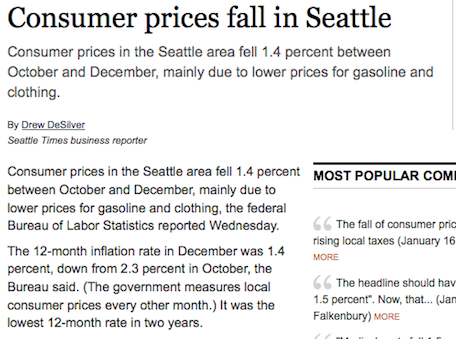Deflation has set in in the Seattle area, according to a misleading Seattle Times story:

This is awfully confusing. The paper’s lead and headline both say that prices fell 1.4 percent in December from October. But the second paragraph tells us that prices were up 1.4 percent from a year ago.
Reporters, if you’ve got month-to-month numbers and year-over-year numbers, you almost always go with the latter. The bimonthly Bureau of Labor Statistics inflation numbers aren’t seasonally adjusted, and they’re much more likely to reflect noise than anything meaningful.
As it turns out, raw prices almost always decline in Seattle from October to December–80 percent of the time in the last decade, according to BLS numbers.
In not reporting any of this context, this story actually makes us less informed.
— The Chicago Tribune has some interesting reporting in its series on the utter fiasco that was Sam Zell’s buyout and ownership of its parent Tribune Company. Zell LBO’d Tribune, loading it up with nearly $13 billion in debt while investing almost no equity:
“To solve the equity problem, Tribune Co. and the deal’s architects reframed it. In presentations for the rating agencies and, later, for potential investors, they pushed a concept some bankers called “synthetic equity,” sources said. This effectively bolstered the equity side of the balance sheet by adding in a number of items including the expected $1 billion in S-Corp tax savings as well as more than $2 billion in Tribune pre-buyout debt that would be pushed down the payout ladder by the new loans”…
One investor, who asked to remain anonymous, said he initially scoffed when JPMorgan presented him with “this bogus book showing synthetic equity.” In an interview, he said: “We’re not stupid. That ain’t equity.”
The Trib does a great job of showing how and why Wall Street financed such an ill-advised deal.
— Laura Gottesdiener interviews Audit Chief Dean Starkman for AlterNet on the financial press and accountability journalism. Here’s a snippet:
Ryan Chittum is a former Wall Street Journal reporter, and deputy editor of The Audit, CJR’s business section. If you see notable business journalism, give him a heads-up at rc2538@columbia.edu. Follow him on Twitter at @ryanchittum.LG: In your piece you call the lead-up to 2006 a “general system failure” for the media, and wrote that the post-crash reporting gave the “short shrift to the breathtaking corruption that overran the mortgage business.”You also diagnosed the financial press today with Stockholm Syndrome.
So what’s going on?
DS: It’s not fully appreciated that there’s been a big power shift between the big media and the institutions that it covers in the last 20 years. When you think of the 1990s, finance was a really powerful industry, but so was media. In the mid-1990s, Dow Jones, which publishes the Wall Street Journal, was almost the same size of Morgan Stanley. Now Morgan Stanley is literally 30 times larger than the New York Times company.
This power shift is almost an intangible thing, but you cannot discount it as part of the story of the rising sense of empowerment and entitlement on Wall Street and an increasing sense of deference from the business press. Also, you can’t deny that the collapse of financial regulation in the early Bush administration plays a role. The press relies, not to a fully appreciated degree, on a financial regulatory system because that generates a lot of paperwork.

